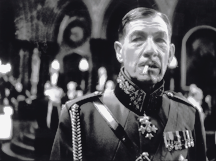The Man Who Would Be King
By Richard von Busack
"I want the milkman in Iowa to see this movie," Ian McKellen says. Like Kenneth Branagh, who told me in an interview that his idea of praise was a North London boy telling him his Henry V was "fuckin' brilliant," McKellen helped streamline a three-hour play in a deliberate attempt to pack in the action. In person McKellen is tall, fit and much younger than the villains he's played on screen recently, either hunchbacked Richard or the would-be rapist in the western The Ballad of Little Jo.
The actor began the film of Richard III not as a movie buff, but as someone who knew the play and had some ideas of where it might be pruned. McKellen recalled at least some of Loncraine's direction as words to the effect of "Come on, dear, we're not on stage, we don't have time for all of that poncy Shakespeare stuff."
After taking his Richard on the road--the production played in the Bay Area three years ago--McKellen already had a sense "of some large bits where the audience was restless." For example, in eliminating the character of Queen Margaret, she of "tiger's heart wrapped in women's hide," McKellen was trying to keep the play in a forward thrust. (Richard III is part of a cycle of plays and there are characters and references that refer to earlier works, particularly Shakespeare's Henry VI).
"I first played Richard in the play on stage in National Theater ... and the director, the designer and I were talking about the play in advance of rehearsals. As often happens, I found myself referring to the events in the near present tense rather than thinking of them as distant history. We wanted to try to tell the story as clearly as possible so someone who has never seen Richard III before would understand.
"There's bits of information you've got to understand--for instance, that Richard is a soldier. I like to see soldiers in uniform, because that's what we expect. In the Middle Ages, they hadn't invented uniforms, and you can't tell that that person is a civil servant rather than a professional politician, and you can't make class distinctions that are important in understanding a group, so I always do Shakespeare in modern dress."
Setting Richard III in the '30s was McKellen's choice because the era was "the last period in recent history where Britain might have fallen for a dictator as other places in Europe did--dictators of the left and the right. I don't want people to think Richard is Hitler. I don't want anyone to believe that it actually happened. We've just borrowed some fascistic imagery, costumes and social setup to make our story believable."
McKellen was sure to avoid Olivier's filmed version of Richard III until after his movie was over. "I saw the Olivier version when it first came out. I deliberately didn't go back--otherwise the interpretation might have been so good, it might have convinced me that there was no point in making this movie."
McKellen revisited the film later. "I was astonished to see what he'd cut out. It's not just one-man show about a charismatic jolly villain, it's about a whole group of power brokers and would-be powerful people, the setting in which Richard moves." Olivier had cut out all but one scene of Richard's mother, played by Maggie Smith in the McKellen version. "When you don't see her telling her son 'I hope you die,' you're missing a part of the psychological truth of it all. And the scene where Richard tries to repeat his success with Lady Anne, by asking Queen Elizabeth for the hand of her daughter, is also gone.
"I've always liked that a very young playwright should have understood that a man's world it may be, but that women are pertinent to it. I am always surprised at Shakespeare's humanity toward everybody, whether they were a servant or a king or a husband. The psychology rings true in even the tiny elements, such as the two murderers in Richard III having a discussion about whether they should do the killing or not. This is the most important day in these men's lives; it flashes by, but it's understood that their lives are as important as Richard's."
I asked McKellen what he made of the complex scene of Anne's seduction by Richard, when Lady Anne is persuaded to accept a ring from the same hand that stabbed her husband to death. Kristin Scott Thomas' Anne is passively upper-crust, making the scene look like a fait accompli, as opposed to the Olivier's version, where Claire Bloom is in shock--"probably in shock because she was working with Olivier, who was directing her," McKellen suggests, "a very unfair advantage to have over the other actors. I detect that Olivier didn't have total faith in the scene, and that's why he splits it into two. ... The bravado of the scene is that it begins and it ends and Richard does it all at once.
"I remember a conversation Kristin Scott Thomas and I had about it. Anne's juices are flowing, she's crying, she's in distress ... once someone convinces her to listen, those juice start flowing in a different way, in relief ... the fact that she gets a chance to tell Richard what she thinks of him--maybe that's all she needs to do to feel better.
"What can you do when someone kneels in front of you, saying they're ready to commit murder because they love you so much? And then what do you do when they say, 'I am prepared to to kill myself for you'? You would have to believe them ... it would just stop you in your tracks. ...
"The fatal mistake," McKellen continues, "the mistake she makes, is to spit at him. A young lady of her social class doesn't go around spitting at people. She's got a good tongue on her; she might have won the scene with words, but she spits. And when she does, she sees in his face all the other times he's been spat on. Afterwards, she sees herself as the wonderful woman who's persuaded this dreadful man to be contrite. She thinks she's converted him, she's different. She discovers immediately that she's wrong."
And McKellen feels that the sexual twistedness is the key to Richard III. "It's the first thing he talks about. 'But I--that not shap'd for sportive tricks...' We can all relate to a certain extent; we've looked in the mirror and thought how unattractive we are. Well, he's not only looked in the mirror, but people have told him how unattractive he is. Setting that scene at the bathroom, I could have him touching parts of himself that he isn't using very much, making himself look in the mirror, promising to take revenge on the world." Today the world, tomorrow a theater near you.
[ Movies Index | Metro | Metroactive Central | Archives ]
© 1996 Metro Publishing Inc., San Jose, CA. All rights reserved. Reproduction
Screenwriter/actor Ian McKellen plays England's most villainous royal in his updated version of 'Richard III'

Fascinating Fascism: Ian McKellen¼s Richard III connives his way to the top in a parallel-universe Nazi-era England ripped by civil war.
My Kingdom for a Bazooka: Richard defends his throne on the battlefield.
A Web Extra exclusive to Metroactive.
or retransmission in any form prohibited without publisher's written permission.
